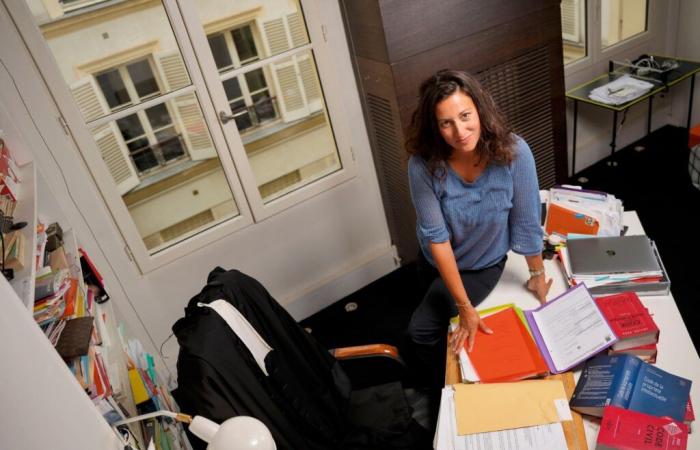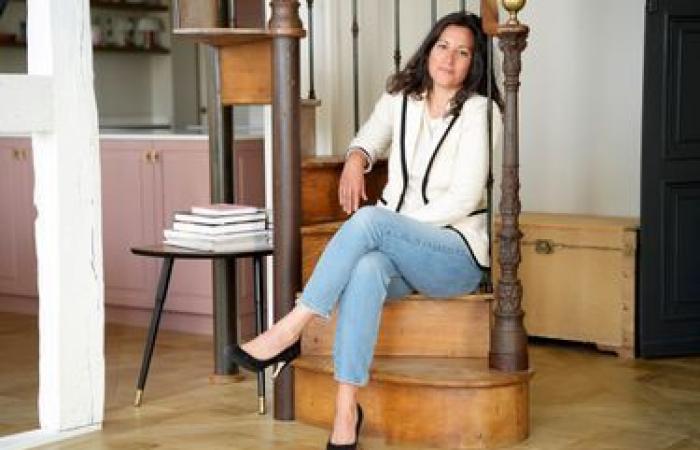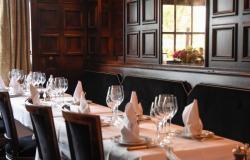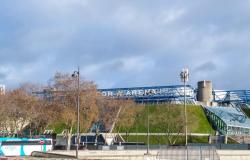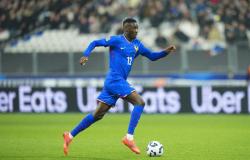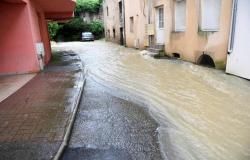In her Parisian office, at the foot of the Saint-Paul metro station, she will have these few words: “Perhaps her heart stopped beating at that precise moment? » Elsa Huisman’s rise has been meteoric. In an ultra-competitive field, at 45, she has become one of the best. No time to lose. Machine gun flow and precise diary. In 2010, she founded Cabinet 111. The lawyer specializing in intellectual property and media law counts artists, broadcasters, financiers, French and international groups, studios and independent producers among her clients.
We met her in “Fugitive because Queen” (ed. Gallimard, 2018), by the novelist Violaine Huisman, where she appears as a strong, ultrasensitive person. His younger sister tells a part of their family history. They are the granddaughters of Georges Huisman (Secretary General of the Presidency of the Republic under Paul Doumer and Director of Fine Arts in 1934) and the daughters of Denis Huisman (philosopher, teacher, entrepreneur). The two sisters, Elsa, born in 1977, and Violaine, born in 1979, are above all the two children of an unknown woman: Catherine Cremnitz.
His first feat of arms: in 2009, an arbitration in favor of Spike Lee. When he returned to Paris, his mother committed suicide
July 2009. Temperatures are up and down. The young lawyer must go to Los Angeles for an international arbitration around “Miracle in Santa Anna”, by American director Spike Lee. Her mother calls her on her birthday, July 12, but to confide that she feels bad. Her eldest daughter explodes on the phone: she needs to be encouraged, for once, as she prepares to deal with her first important case. Elsa Huisman has always been afraid of flying. A ritual exists between mother and daughter. The first calls the second, before each flight, to reassure her. There, and only there, Catherine Cremnitz found her adult role.
The tense phone call takes place before leaving for Los Angeles. The arbitration is won. Elsa Huisman tries to contact her mother before the flight back to Paris. Nobody answers. However, his younger sister did indeed speak to him at the same time. Elsa Huisman enters the plane. During the flight, she felt unwell and fell stiffly in the aisle. Barely arriving in Roissy, she heads towards rue de Bellechasse, in Paris, to get news from her mother. Catherine Cremnitz committed suicide on July 26 at the age of 62. In the apartment, a farewell word. When she read it, a young policewoman whispered to Elsa Huisman: “Your mother was very angry with you. »
Regarding her discomfort on the plane, Elsa Huisman repeats the words she said to a psychiatrist: “Maybe her heart stopped beating at that precise moment? » She was unable to go beyond the first fifteen pages of “Fugitive because Queen”, as the emotion resembled a villainous wave. The two little Huisman sisters apparently have everything. They are lovely, intelligent. Good students in a privileged environment. But they grow up in a dysfunctional family. A sublime mother diagnosed as bipolar with schizophrenic tendencies and an immature and egocentric father.
The rest after this ad
At the Huismans, behind the perfect outfit, prestigious apartment and great schools, reality is a mixture of violence, madness, lust
Behind the perfect outfit – apartment in the 7th arrondissement of Paris and studies in Louis-le-Grand and Henri-IV – the reality is a mixture of violence, madness, lust. Their mother was interned numerous times in a psychiatric hospital; their father has eight children from four different women. Catherine Cremnitz drags her eldest daughter by the hair. Blows and screams. The two sisters survive through an unbreakable bond between them. Elsa Huisman: “My sister wouldn’t have chosen me as a friend, but we have unconditional love for each other. We couldn’t get angry. The adults around us were failing. We had to survive more than live. We had to fight, take our destiny into our own hands, believe that we were going to succeed. It was not possible for us to give up. We had to adapt at all costs. »
A seemingly normal family: the parents celebrate Elsa’s 7th birthday. With his sister, Violaine, on his mother’s lap, at the Jardin d’acclimatation, July 12, 1977.
© DR
Hence, his combativeness, his obstinacy, his authenticity. She assures not to lie: “Never. » The two sisters are the last children of Denis Huisman. “We were numbers 7 and 8.” Suicides are numerous, on both sides of the family. His father never said the word “suicide” to his ex-wife and said that she was traveling when she was interned. Elsa Huisman came across a prescription from Sainte-Anne one day and looked up the word “psychiatric” in the dictionary. She understood, at the age of 12, that her mother was crazy. The memories come back.
She is 35 years old, she is already a lawyer. Denis Huisman invites him to lunch. He spends the meal talking about the suicide of one of his brothers, whose two children each killed themselves. One by swallowing cyanide; the other by throwing himself from the Eiffel Tower. His father then said: “When one of the parents commits suicide, the child inevitably commits suicide. » The eldest daughter left the table. Elsa Huisman has a house in Perche, Normandy, purchased in 2013. Her wife and children live there all year round. His passion for horse riding is intact. She likes to go on one of her black horses, into nature, for long walks. She observes: “We forget everything. »
The two sisters will build homes and careers
The two sisters will build homes and careers. The lawyer emphasizes their luck during their childhood: good health, a privileged lifestyle, a cultured family, a strong temperament. “I cannot make concessions on my character, because it is thanks to him that I held out in a hostile environment. » Violaine Huisman moved to New York in 1998, at the age of 19. “Fugitive because Queen”, sold 45,000 copies, was a success. Elsa Huisman followed a prestigious international law course, between the Sorbonne, in Paris, and King’s College, in London, for four years. “My sister was brilliant, while I was needy. She was the introverted intellectual; I was the extroverted sportswoman. Out of survival instinct, I had to shine in my father’s eyes. I was able to sacrifice my weekends to work when I was a teenager. My father would slip me big bills so I could go have fun. I put them aside for the future. I wanted to be above the rest and all I had to do was work to get there. »
She passed the New York bar. The little girl who lived in chaos chooses the law, the numbers, the rigor. “During my childhood, I came to restore order in the home. I took the bottles of alcohol out from under the bed, I called the emergency services, I monitored their comings and goings. I had the dual mission of protecting my mother from herself and my sister from my mother. What kept me alive: protecting them. » Two family places were important to her. The apartment of his maternal grandparents located in Montreuil, a couple of simple people with meals at fixed times. Everything was normal there. Banality can be a joy. His father’s house in Brittany, at the tip of Arcouest, in Côtes-d’Armor, is also a key place. The two sisters spend their summers there. “My parents respected a framework there. The house was small so they couldn’t have their giant orgies like in the Parisian apartment. »
Elsa Huisman is based in Paris but maintains part of her activity in New York, where she passed the bar and learned to work in the Anglo-Saxon style.
Paris Match
/
© Alvaro Canovas
“Luck plays no role in my field. I have always believed in one thing: work, work, work. »
Elsa Huisman has always been fascinated by artistic circles. She therefore decided to enter cultural circles as a lawyer. “Luck plays no role in my field. I have always believed in one thing: work, work, work. » In an increasingly complex world, its role consists of supporting the financial and legal arrangements for artistic and cultural projects. “Before, there were two film producers who mortgaged their houses and high-fived each other. Today, with the proliferation of platforms, impossible. Projects must be supported comprehensively. Everything has become more complex and judicialized in cultural and artistic arrangements. »
Elsa Huisman advises, structures, defends. In the Anglo-Saxon way, it bridges the gap between creation and marketing. Businessmen Xavier Niel and Pierre-Antoine Capton placed their trust in him early on. The lawyer counts, among her clients, the directors Ladj Ly, Justine Triet, Rebecca Zlotowski; the writers Guillaume Musso and Joël Dicker; actor Jonathan Cohen; the Mediawan audiovisual group; the artist Claire Tabouret. The lawyer may find herself defending an artist vis-à-vis a platform, while having been the lawyer of the same platform. Its detractors point to risks of conflicts of interest. Either it raises them upstream, or it turns them into a force.
Shortly before her father’s death, Elsa Huisman bought a house in Launay Bay, where she spent her childhood vacations with her sister. The house belonged to the village mechanic. The view is magnificent, facing the immensity of the sea. Elsa Huisman goes there every summer, with her two children. She explains to them that their base is there. She passes on to them the good part of the family history. There is always one.

